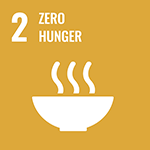Strengthening of Resilience in Arid Agro-Ecosystems Vulnerable to Climate Change, Through Research on Plant Resources and Technological Applications
Principal Investigator


Prof.
Chemical Research Institute, Universidad Mayor de San Andrés
Giovanna Rocío Almanza Vega
ODA Recipient Country
Plurinational State of Bolivia
Research Institutions in Japan
Japan International Research Center for Agricultural Sciences (JIRCAS) / Kyoto University / Tokyo University of Agriculture and Technology / Obihiro University of Agriculture and Veterinary Medicine
Research Institutions in Counterpart Country
Universidad Mayor de San Andrés (UMSA) / Fundación PROINPA
Adoption fiscal year
FY 2019
Research Period
5 Years
Overview of the Research Project
Developing and disseminating sustainable quinoa production technology to cope with climate change
Quinoa is highly nutritious, and it is the only crop that can be cultivated in the highlands of Bolivia that lie at an elevation of approximately 4,000 meters, an extremely unfavorable environment with saline soil, droughts, and frost. However, quinoa production is currently at risk due to issues such as soil erosion caused by frequent extreme weather and the expansion of farmlands. This project develops and introduces sustainable quinoa production technology through the establishment of genetic resources for quinoa, development of new breeding lines with enhanced resilience, management of fallow land, and coordinated crop-livestock production.
Contributing to global food security with a superfood native to the Andes
This project will contribute to stable food production and improved national income in Bolivia through the development and spread of sustainable quinoa production technology. Global food security is expected to be enhanced through the application of technology developed in this extremely adverse environment to other arid regions throughout the world at risk of desertification, as well as to a wide variety of farming environments.
Photo gallery
Research Project Web site
Press Release
Links
Projects
Contact Us
Japan Science and Technology Agency (JST)
Department of International Affairs
SATREPS Group
TEL : +81-3-5214-8085
Related articles by Category
- Bioresources
Bioresources

 Republic of Indonesia
Republic of Indonesia
Promoting the blue economy by utilizing seaweed resources!
Development of Sustainable Seaweed Based Functional Products for Promoting Blue Economy
- Bolivia
Environment / Energy
(Climate Change)
 Plurinational State of Bolivia
Plurinational State of Bolivia
Monitoring from an Eye in Space: Securing Water for a City of 2 Million Above the Clouds
Study on the Impact of Glacier Retreat on Water Resource Availability for the Cities of La Paz and El Alto
- Latin America
Disaster Prevention and Mitigation

 Republic of El Salvador
Republic of El Salvador
Protecting international port cities from compound disasters with dominostyle chains of destruction!
Compound Disaster Risk Reduction associated with Large Earthquakes and Tsunamis
- SDGs : Goal.2
Bioresources

 Republic of Indonesia
Republic of Indonesia
Achieve sustainable vegetable production in tropical regions using advanced breeding technology!
Breeding Innovation in Chili Pepper and Tomato to Accelerate Sustainable Vegetable Production in Tropical Regions























